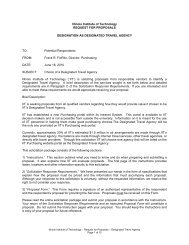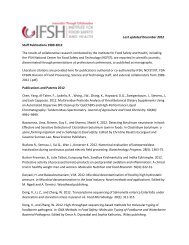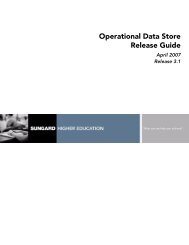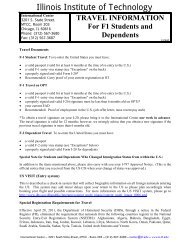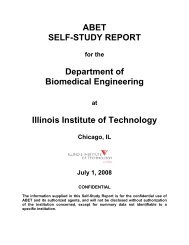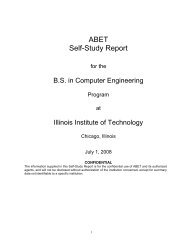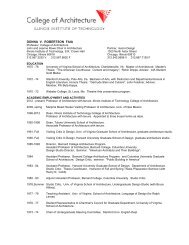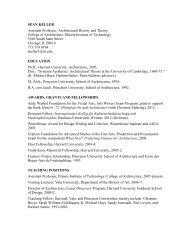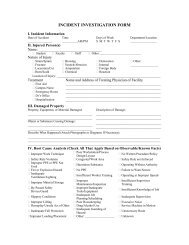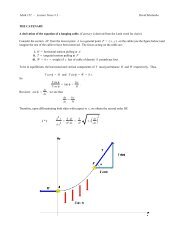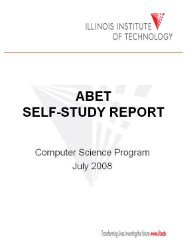Download entire Student Handbook - Illinois Institute of Technology
Download entire Student Handbook - Illinois Institute of Technology
Download entire Student Handbook - Illinois Institute of Technology
You also want an ePaper? Increase the reach of your titles
YUMPU automatically turns print PDFs into web optimized ePapers that Google loves.
investigate, as he or she deems appropriate, and, if he or she determines necessary, in his or her sole<br />
discretion, will correct any factual inaccuracies in the record. The decision <strong>of</strong> the Dean <strong>of</strong> <strong>Student</strong>s as to<br />
such matters shall be final.<br />
If a violation concerns conduct relating to coursework, the course instructor may meet with the student and<br />
impose one <strong>of</strong> the sanctions below if after the meeting the instructor has satisfied himself or herself that a<br />
violation has in fact occurred. The meeting may be held in consultation with the academic unit head, or<br />
with the Academic Honesty Committee <strong>of</strong> the academic unit. The course instructor will report the violation,<br />
a summary <strong>of</strong> the facts evidencing the violation and the sanction to the DDAD. Appropriate sanctions<br />
include:<br />
<br />
<br />
Expulsion from a course. The student is assigned a punitive failing grade <strong>of</strong> ‘E’ for the course and<br />
can no longer participate in the course or receive evaluation <strong>of</strong> coursework from the instructor.<br />
Reduction in grade. A reduction in grade for the assignment or exam involved or for the course may<br />
be applied.<br />
Upon receipt <strong>of</strong> information about a violation <strong>of</strong> the Code, the DDAD will review the report and any record<br />
<strong>of</strong> prior violation <strong>of</strong> the Code by the student. If there are one or more prior violations, the DDAD will<br />
consult with the Chair <strong>of</strong> the Academic Grievance Committee <strong>of</strong> the University Faculty Council to<br />
determine whether the matter should be referred to a hearing before the Academic Grievance Committee<br />
for further sanctions. The DADD’s decision to refer a matter to the Academic Grievance Committee shall<br />
be made in his or her sole discretion and shall be final. If the matter is referred for a hearing, the<br />
Academic Grievance Committee shall supplement its membership as necessary so that the Committee<br />
includes at least one faculty member from the Academic Honesty Committee <strong>of</strong> the academic unit where<br />
the violation occurred, one member <strong>of</strong> the student’s major faculty, one other faculty member, two students<br />
and the Dean <strong>of</strong> <strong>Student</strong>s or his or her designee. The Academic Grievance Committee so supplemented<br />
will form a disciplinary committee for the purpose <strong>of</strong> investigating the matter and making findings and a<br />
recommendation to the DDAD. The chair <strong>of</strong> the Academic Grievance Committee shall chair this<br />
disciplinary committee.<br />
A student who is to appear before such a disciplinary committee shall be notified in writing by the Dean <strong>of</strong><br />
<strong>Student</strong>s <strong>of</strong> the charges, in summary fashion, placed against him or her and the time and place <strong>of</strong> the<br />
hearing. This notice shall be delivered to the student at least five days before the hearing. A student<br />
appearing before the disciplinary committee has the right to be accompanied by an advisor, witnesses on<br />
his or her behalf, and his or her parents. The advisor is limited to advising the student and may not<br />
participate in presenting the case, questioning witnesses, or making statements during the hearing. A<br />
student shall have the right to make an oral statement both at the start and the conclusion <strong>of</strong> the hearing<br />
and to submit written evidence to the committee. Further, as a general rule, a student shall have the right<br />
(i) to present and to question any witnesses <strong>of</strong> his or her choosing that have information relevant to the<br />
charges against him or her, provided that the chair may, in his or her sole discretion, disallow witnesses<br />
whose testimony would be redundant or not germane to the charges; and (ii) to cross-examine any witness<br />
that is called to testify in support <strong>of</strong> the charges, provided that the chair may, in his discretion, limit such<br />
cross-examination to the extent it is not germane to the charges, is redundant or becomes abusive or<br />
harassing. Members <strong>of</strong> the committee may, as each deems appropriate, ask questions <strong>of</strong> any witness<br />
called or regarding any evidence submitted. To the extent deemed necessary to maintain decorum or to<br />
protect students from harassment or to ensure the integrity <strong>of</strong> the process, the chair may require a student<br />
to direct questions to the chair who will then ask them <strong>of</strong> a witness or witnesses.<br />
An audio tape recording <strong>of</strong> the hearing will be made. The audio tape will remain the sole property <strong>of</strong> the<br />
University. No other record <strong>of</strong> the hearing may be made.<br />
Once proper notification has been given, the University reserves the right to hold the hearing whether or<br />
not the student elects to participate. Email correspondence will be considered sufficient written notification in<br />
all instances where written notification is required.<br />
Upon receipt <strong>of</strong> the findings <strong>of</strong> the disciplinary committee, which findings may include recommended<br />
sanctions, the DDAD shall determine the appropriate action to be taken and shall so notify the student.<br />
The disciplinary committee may recommend, and the DDAD may impose, any <strong>of</strong> the following sanctions:<br />
<br />
Expulsion from a course. The student is assigned a punitive failing grade <strong>of</strong> ‘E’ for the course and



